13 Best Customer Service Mobile Apps & Pricing for 2025

Is your support team struggling with clunky mobile apps that feel stuck in 2015? When 90%* of customers expect instant support, relying only on ticketing systems is costing you business. Today’s mobile-first customers demand seamless support experiences.
Enter modern customer service mobile apps. These aren’t just scaled-down versions of desktop software; they’re powerful platforms designed to transform how teams deliver support on the go.
But with countless options promising similar features, how do you identify the solutions that actually deliver value? We’ve analyzed the top customer service mobile apps to help you cut through the noise and find the perfect fit for your team.
What is a Customer Service App?
Think beyond basic ticket management. Modern customer service solutions turn mobile devices into comprehensive support hubs. These apps enable teams to handle everything from complex customer inquiries to performance analytics, all while maintaining the flexibility to support customers from anywhere.
The 13 Best Customer Service Mobile Apps
Before diving into detailed reviews, let’s understand what sets exceptional customer service apps apart. The best solutions combine powerful features with intuitive mobile interfaces, ensuring teams can deliver outstanding support whether they’re at their desk or on the move.
Key features
Key features to consider:
1. CloudTalk
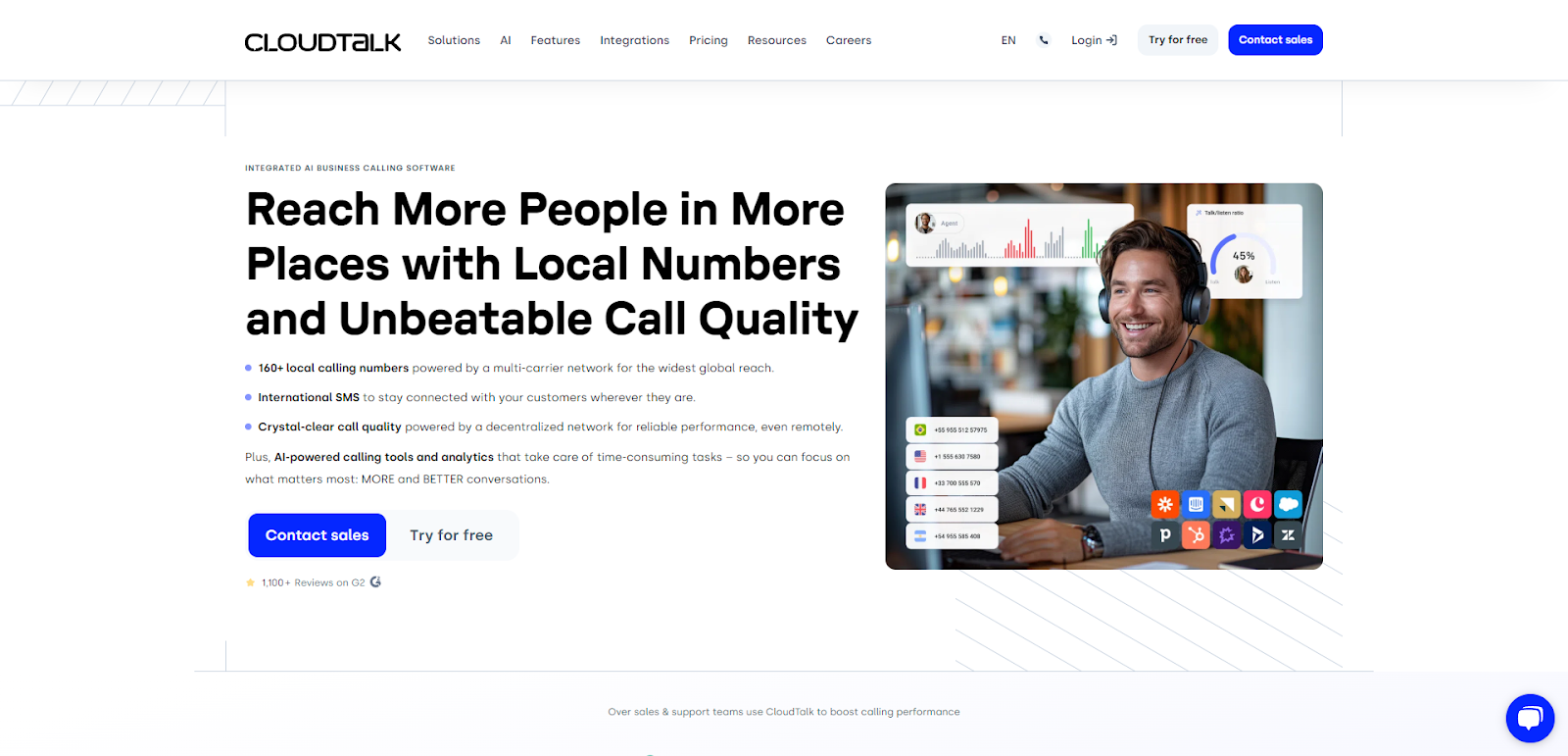
CloudTalk’s mobile app transforms smartphones into powerful customer service hubs, offering advanced communication features, real-time analytics, and seamless integrations that help teams deliver exceptional support from anywhere.
Best for
- SMBs requiring mobile and scalable communication solutions
Pricing
- Starter: $25/user/month
- Essential: $29/user/month
- Expert: $49/user/month
- Custom: Tailored pricing available
Explore CloudTalk’s in-depth pricing guide.
Best Features
- AI-powered call management
- Real-time performance analytics
- International numbers
- Mobile app
Integrations
Explore CloudTalk’s integrations
Pros & cons
Pros:
- Intuitive mobile interface
- Comprehensive analytics
- Seamless CRM integrations
- Real-time performance insights
Cons:
- Advanced features require setup
- Limited offline functionality
- Premium features in higher tiers
- Basic plan feature restriction
Considerations:
- Balance ease-of-use with feature depth needed
- Assess how often teams work without internet
- Compare ROI against integration benefits
- Match feature access to team requirements
User Reviews
2. Dialpad
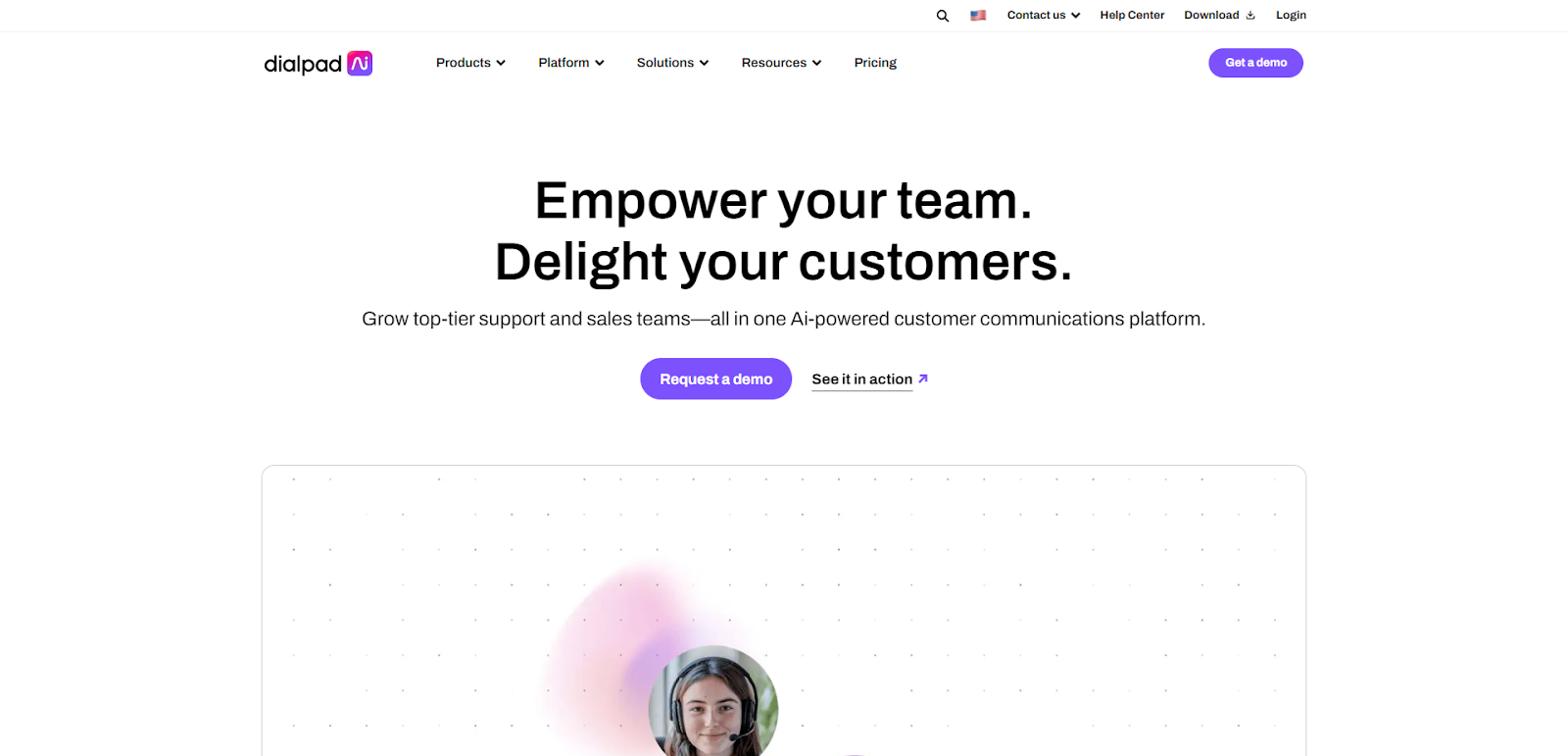
Transform your customer service operations with Dialpad’s communication platform. This enterprise-focused solution combines voice intelligence with omnichannel capabilities to enhance customer interactions across touchpoints.
Best for
- Enterprise teams seeking communication solutions
Pricing
- Standard: $15/user/month
- Pro: $25/user/month
- Enterprise: Contact for pricing
Explore Dialpad’s in-depth pricing guide.
Best Features
- AI Intelligence
- Real-time transcription
- Omnichannel routing
- Video conferencing
Integrations
- Salesforce
- Zendesk
- Microsoft 365
- Google Workspace
Pros & cons
Pros:
- Advanced AI capabilities
- Enterprise-grade analytics
- Real-time voice insights
- Omnichannel support tools
Cons:
- Limited global AI coverage
- Complex initial setup
- Higher costs for global teams
- Steep learning curve
Considerations:
- Evaluate your international support needs
- Factor in implementation timeline
- Map out your scaling roadmap
- Assess team’s technical readiness
3. Five9
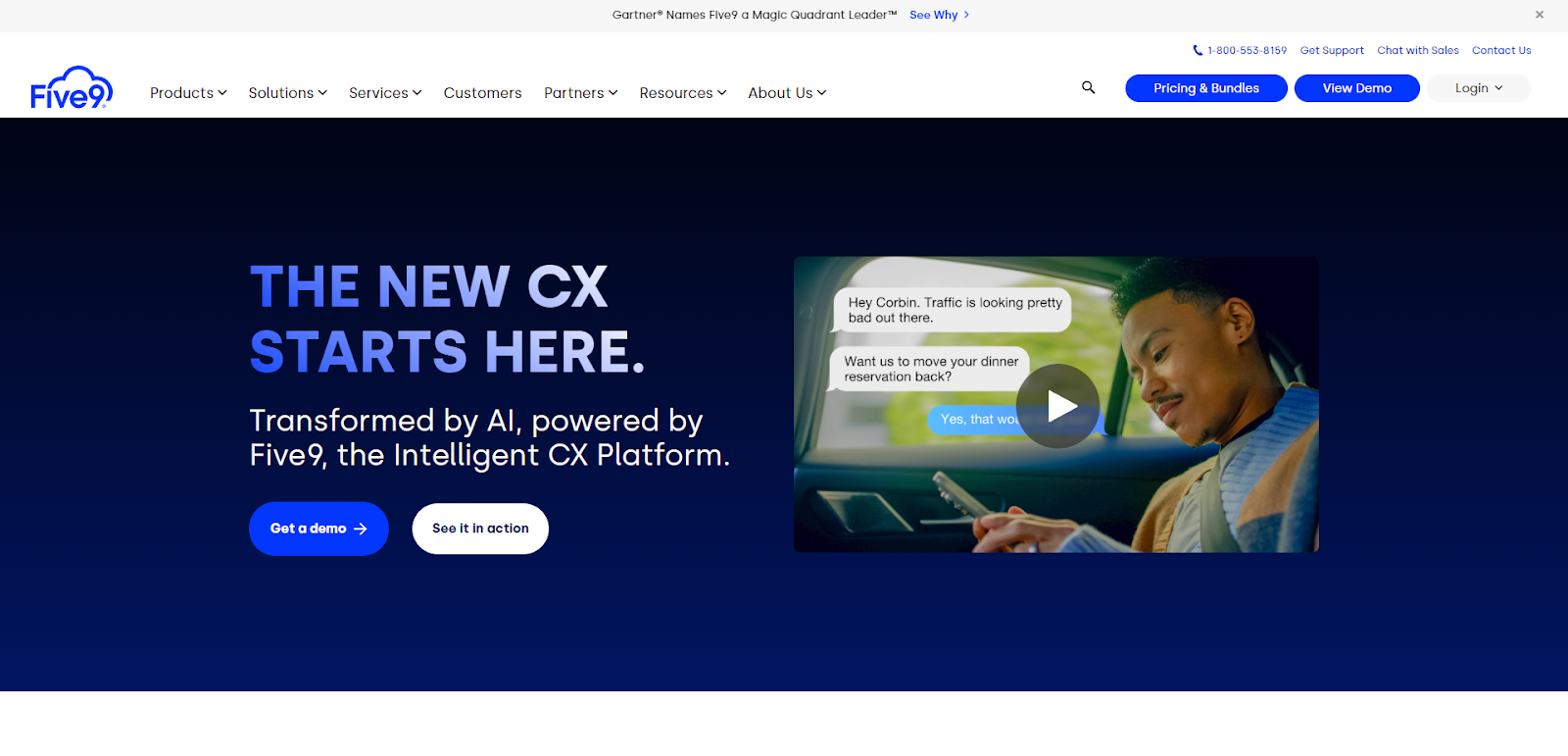
A cloud-native contact center solution designed for enterprise-scale operations, Five9 delivers advanced routing capabilities and workforce optimization tools for complex customer service environments.
Best for
- Large enterprises requiring sophisticated contact center functionality
Pricing
- Digital (Digital-only): $119/user/month
- Core (Voice-only): $119/user/month
- Premium (Digital + Voice): Contact for flexible pricing
- Optimum (Digital + Voice + WEM): Contact for flexible pricing
- Ultimate (Digital + Voice + WEM + Analytics): Contact for flexible pricing
Explore Five9’s in-depth pricing guide.
Best Features
- Intelligent call routing
- Workforce management
- Digital engagement tools
- Performance analytics
Integrations
- Salesforce
- Microsoft
- Zendesk
Pros & cons
Pros:
- Mature AI features
- Enterprise-level functionality
- Advanced call routing
- Comprehensive analytics
Cons:
- Complex pricing structure
- Steep learning curve
- Implementation fees
- Technical expertise needed
Considerations:
- Map long-term budget requirements
- Plan comprehensive team training
- Factor in total deployment costs
- Assess internal IT capabilities
4. JustCall
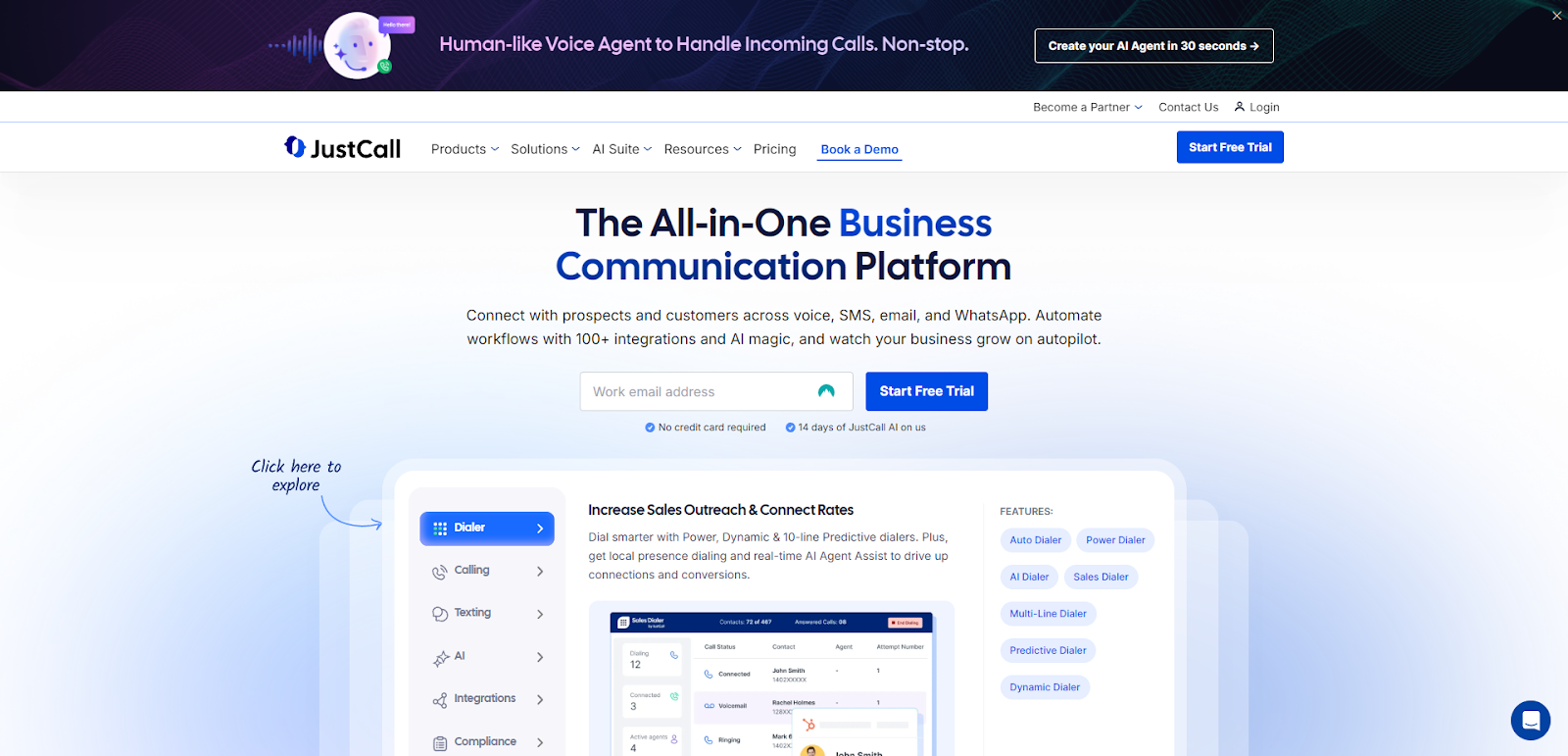
A sales-focused communication platform, JustCall combines calling capabilities with SMS functionality to help teams engage customers across multiple channels.
Best for
- Sales teams prioritizing integrated calling and messaging workflows
Pricing
- Essentials: $19/user/month
- Team: $29/user/month
- Pro: $49/user/month
- Business: Custom pricing (10 users minimum)
Explore JustCall’s in-depth pricing guide.
Best Features
- Power dialer
- SMS campaign tracking
- Basic AI capabilities
- Call recording
Integrations
- Pipedrive
- HubSpot
- Slack
Pros & cons
Pros:
- Integrated SMS capabilities
- User-friendly interface
- Quick setup process
- Straightforward workflows
Cons:
- Limited global coverage
- Basic reporting functions
- Intermittent connectivity
- Restricted integration options
5. Kixie
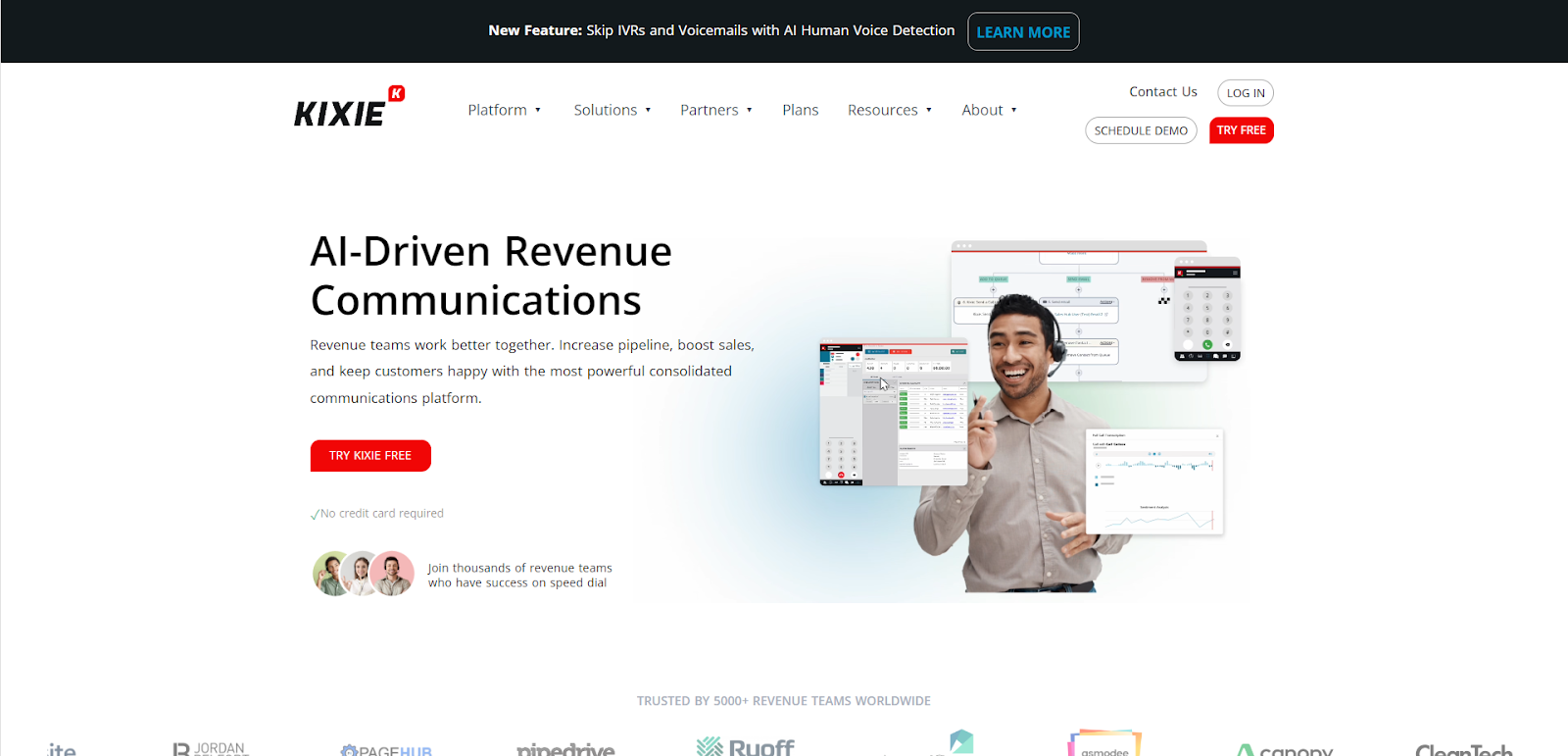
A specialized sales engagement solution, Kixie focuses on outbound calling needs with integrated CRM functionality for small to medium-sized businesses.
Best for
- SMBs requiring focused outbound calling capabilities
Pricing
- Integrated: Contact for pricing
- Professional: Contact for pricing
- Outbound PowerDialer: Contact for pricing
- Ultimate Revenue: Contact for pricing
Explore Kixie’s in-depth pricing guide.
Best Features
- Auto dialer
- CRM integration
- SMS functionality
- Call analytics
Integrations
- Pipepdrive
- HubSpot
- Zapier
Pros & cons
Pros:
- Affordable entry-level plans
- Outbound dialer capabilities
- Easy CRM integration
- Quick implementation
Cons:
- Limited international support
- Basic mobile app
- Restricted support hours
- Simple reporting tools
Considerations:
- Review global support needs
- Evaluate mobile usage requirements
- Match support hours to team schedule
- Define analytics requirements
6. RingCentral
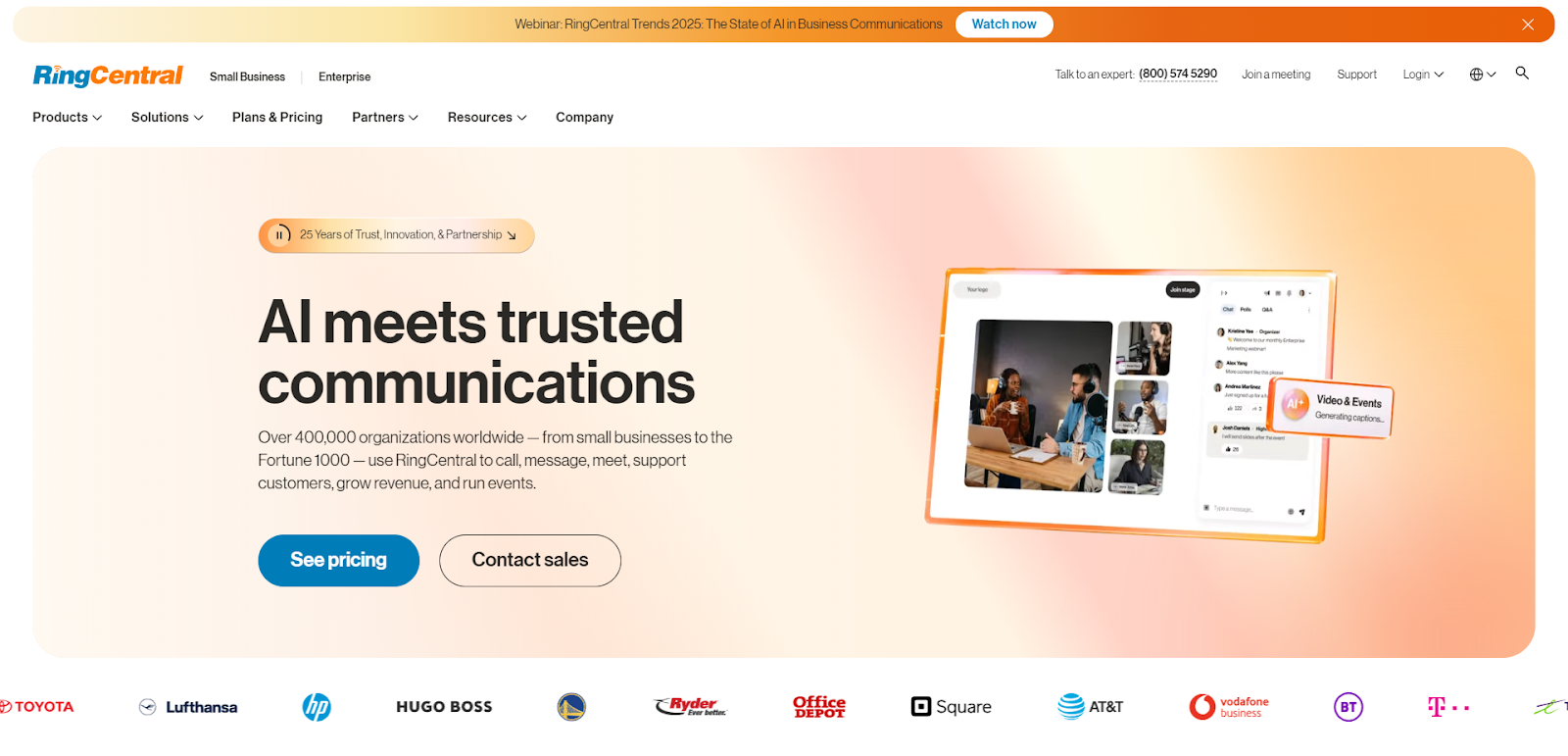
RingCentral’s unified platform combines voice, video, and messaging capabilities into a comprehensive enterprise solution that adapts to diverse communication needs.
Best for
- Organizations seeking an all-in-one unified communications platform
Pricing
- Core: $20/user/month
- Advanced: $25/user/month
- Ultra: $35/user/month
Explore RingCentral’s in-depth pricing guide.
Best Features
- Voice calling
- Integrated video conferencing
- Team collaboration tools
- Contact center solutions
Integrations
- Microsoft 365
- Salesforce
- Google Workspace
Pros & cons
Pros:
- Comprehensive feature suite
- Extensive integration options
- Robust team messaging
- Flexible deployment choices
Cons:
- Complex implementation process
- Variable call quality worldwide
- Higher costs for advanced features
- Steep administrative learning curve
Considerations:
- Plan deployment timeline carefully
- Test quality in key locations
- Map features to business needs
- Assess admin team capabilities
7. Ringover
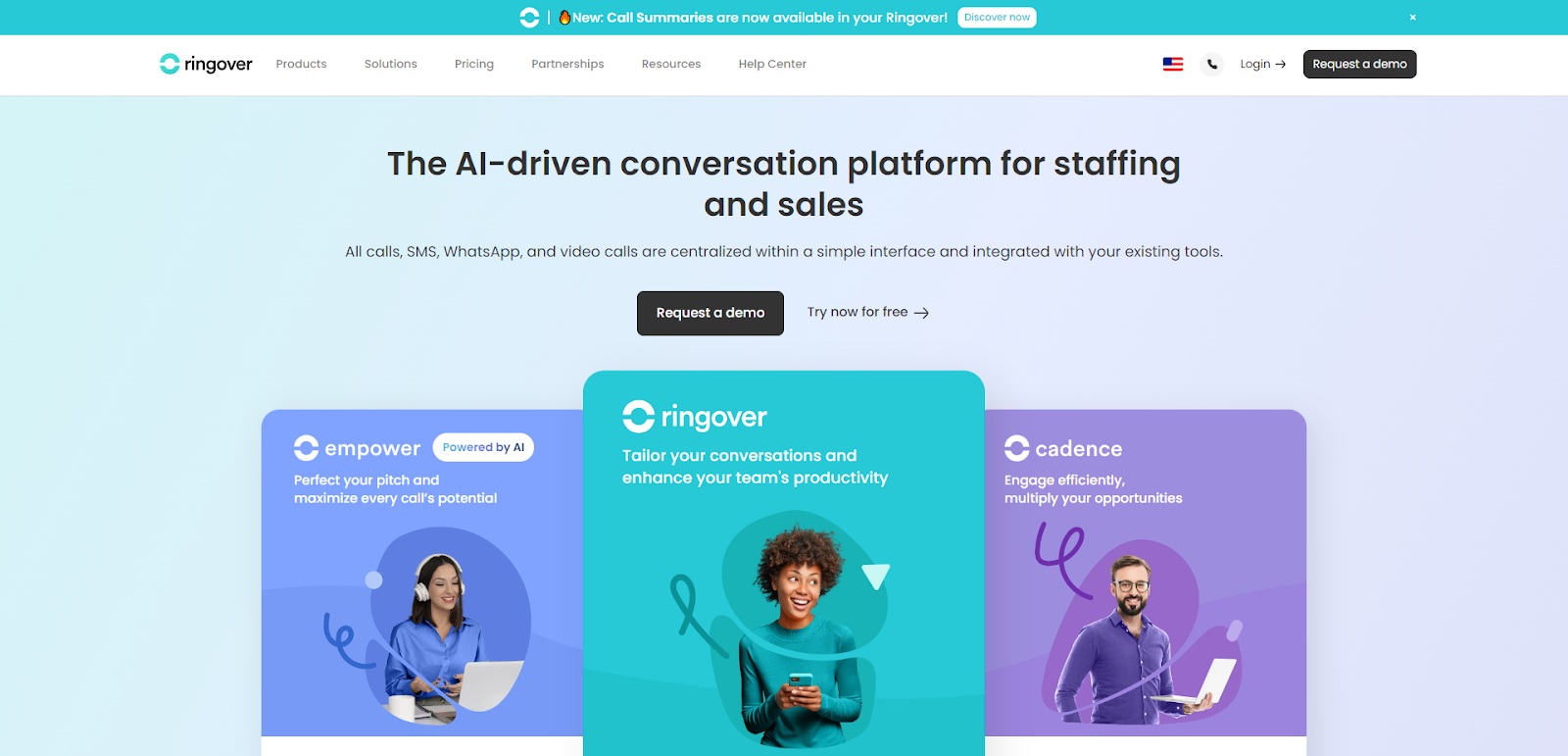
A European-born VoIP platform bringing fresh perspective to business communications. Ringover focuses on simplicity and core functionality, making it particularly appealing for SMBs seeking straightforward communication solutions without complexity.
Best for
- Small businesses needing reliable communication tools
Pricing
- Smart: $21/user/month
- Business: $44/user/month
- Advanced: $54/user/month
Explore Ringover’s in-depth pricing guide.
Best Features
- Call management
- SMS capabilities
- Basic analytics dashboard
- Social media integration
Integrations
- WhatsApp Business
- Popular CRM platforms
- Messaging apps
Pros & cons
Pros:
- Clean, intuitive interface
- Straightforward pricing
- Quick implementation
- Built-in SMS tracking
Cons:
- Limited advanced features
- Basic reporting capabilities
- Inconsistent call quality
- Restricted CRM functionality
Considerations:
- Match features to growth trajectory
- Define reporting requirements
- Test in primary business regions
- Review integration priorities
8. Freshdesk
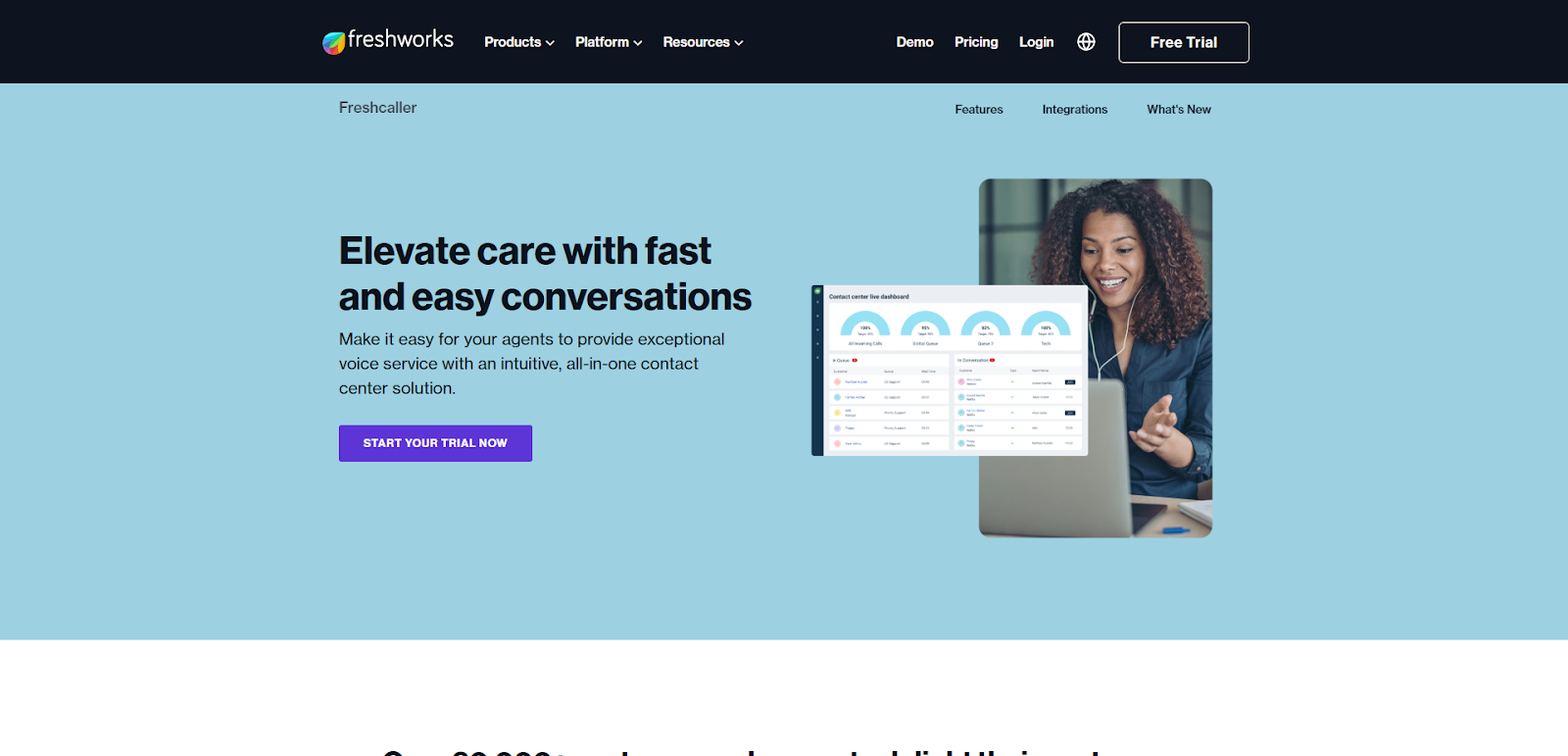
Freshdesk’s mobile app empowers teams with a clean interface and smart automation tools, making it particularly appealing for growing businesses transitioning from basic help desk solutions.
Best for
- Teams seeking an intuitive ticketing and support solution
Pricing
- Free: $0/agent/month
- Growth: $15/agent/month
- Pro: $39/agent/month
- Enterprise: $69/agent/month
Explore Freshdesk’s in-depth pricing guide.
Best Features
- Unified ticket inbox
- Automation workflows
- Team collaboration tools
- Knowledge base management
Integrations
- Slack
- Google Workspace
- Shopify
Pros & cons
Pros:
- Intuitive mobile interface
- Strong automation options
- Quick implementation
- Collaborative tools
Cons:
- Limited voice capabilities
- Basic reporting in lower tiers
- Some features need add-ons
- Email-first approach
Considerations:
- Review voice support volumes
- Define reporting requirements
- Map essential vs. optional features
- Evaluate primary support channels
9. Help Scout
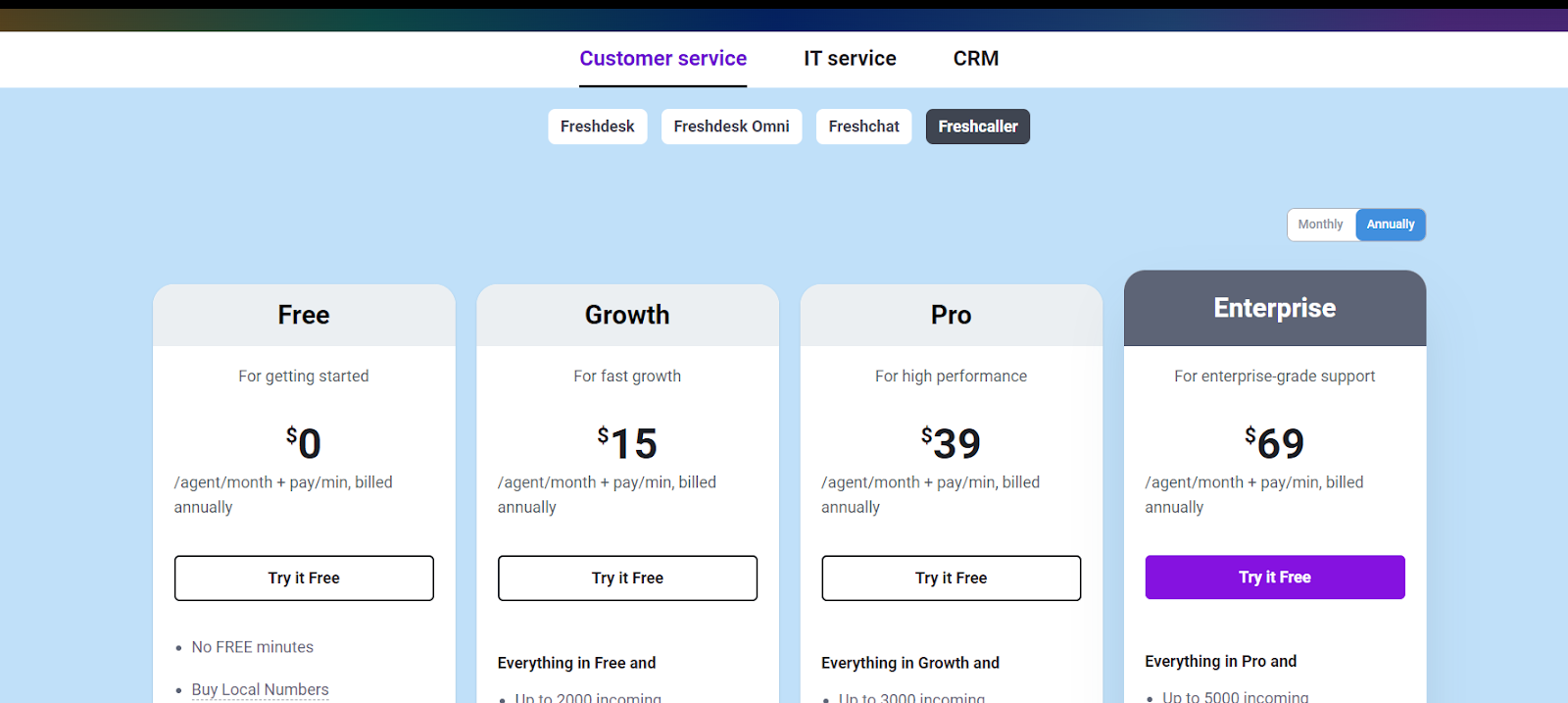
Help Scout’s mobile solution emphasizes human-centric support with powerful collaboration tools that keep distributed teams connected and customers satisfied.
Best for
- Remote support teams prioritizing personalized customer interactions
Pricing
- Free: $0/month (up to 50 contacts per month, unlimited users)
- Standard: $50/month (for 100 contacts per month, unlimited users)
- Plus: $75/month (for 100 contacts per month, unlimited users)
Best Features
- Shared inbox management
- Real-time collaboration
- Customer tracking
- Integrated knowledge base
Integrations
- HubSpot
- Jira
- Mailchimp
Pros & cons
Pros:
- Exceptional mobile UX
- Strong team collaboration
- Clear customer history
- Built-in knowledge tools
Cons:
- Limited voice support options
- Basic automation in lower tiers
- Minimal customization options
- Email-focused workflow
Considerations:
- Evaluate voice vs. email support needs
- Identify automation priorities
- Define required customization level
- Review your support channel mix
10. Intercom
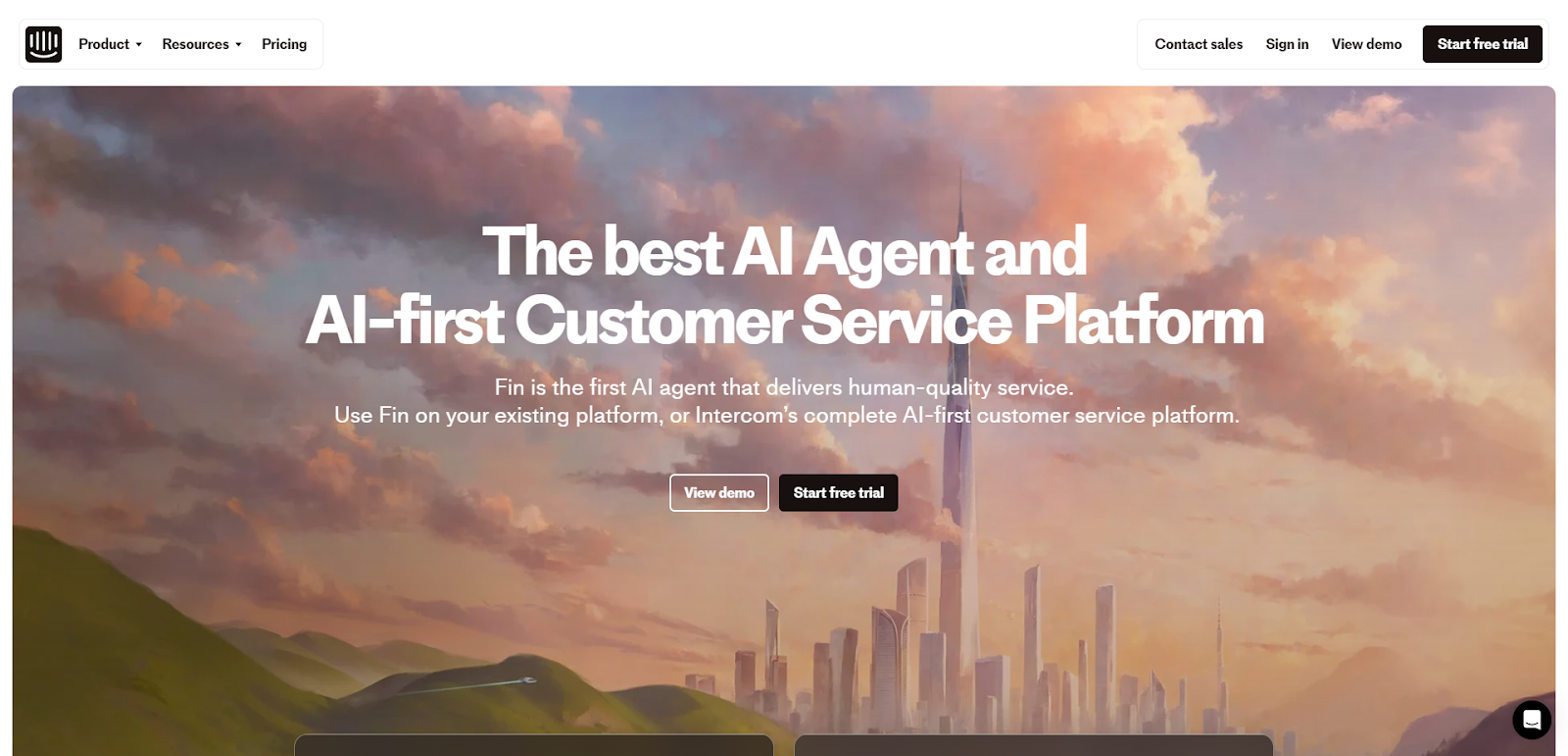
Built for modern digital businesses, Intercom transforms customer interactions into meaningful engagements through intelligent automation and personalized communication flows.
Best for
- Digital-first companies needing conversational support solutions
Pricing
- Essential: $29/seat/month
- Advanced: $85/seat/month
- Expert: $132/seat/month
Best Features
- Voice calls
- Reporting and analytics
- Integrated knowledge base
- Workflow design
Integrations
- Stripe
- Shopify
- Slack
- Product analytics tools
Pros & cons
Pros:
- Powerful automation tools
- Rich customer insights
- Modern interface design
- Smart segmentation
Cons:
- Premium pricing model
- Complex feature setup
- Limited voice capabilities
- Steep learning curve
Considerations:
- Evaluate automation ROI potential
- Plan feature implementation phases
- Assess voice support requirements
- Consider team training resources
11. Zendesk
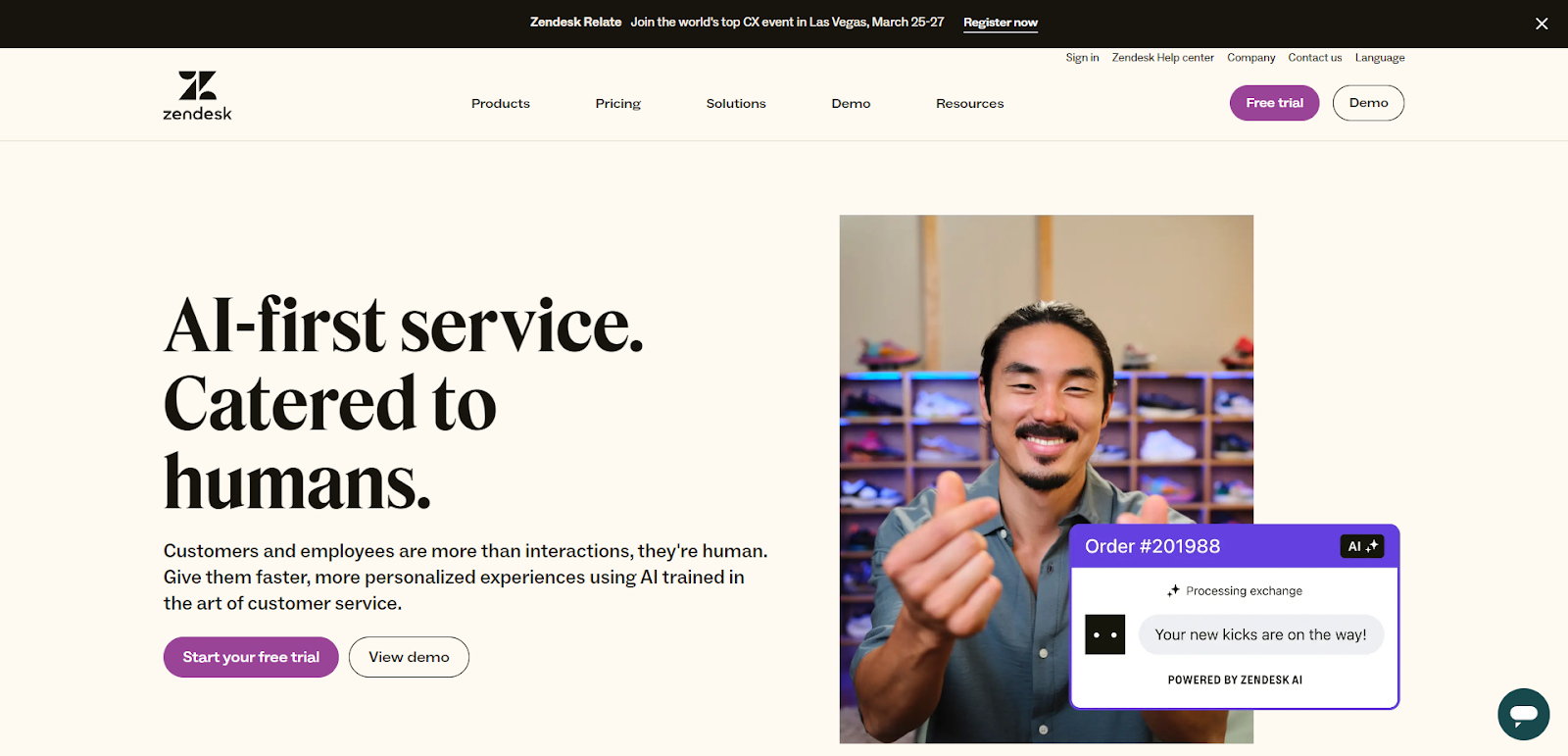
Zendesk combines enterprise-grade functionality with intuitive design, helping teams manage complex support operations while maintaining the flexibility to assist customers from anywhere.
Best for
- Enterprise organizations requiring mobile support capabilities
Pricing
- Support Team: $19/agent/month
- Suite Team: $55/agent/month
- Suite Professional: $115/agent/month
- Suite Enterprise: Contact for pricing
Explore Zendesk’s in-depth pricing guide.
Best Features
- Omnichannel ticketing
- AI-powered suggestions
- Workflow builder
- Custom analytics
Integrations
- Salesforce
- Microsoft Teams
- Shopify
Pros & cons
Pros:
- Comprehensive toolkit
- Powerful customization
- Extensive marketplace
- Rich reporting options
Cons:
- Significant investment needed
- Complex implementation
- Feature overlap across plans
- Resource-intensive setup
Considerations:
- Calculate total implementation costs
- Map your customization priorities
- Identify must-have features first
- Assess available technical resources
12. Front

This platform bridges the gap between personal email and shared inboxes, enabling support teams to deliver more personalized service while maintaining efficiency at scale.
Best for
- Teams seeking collaborative email-centric customer support solutions
Pricing
- Starter: $19/seat/month ( up to 10 seats)
- Growth: $59/seat/month (no seat minimum)
- Scale: $99/seat/month (2 seat minimum)
- Premier: Contact for pricing
Best Features
- Collaborative inbox management
- Message assignment rules
- Analytics dashboard
- Custom workflows
Integrations
- Gmail
- SMS platforms
- Asana
Pros & cons
Pros:
- Intuitive collaboration tools
- Clean mobile interface
- Smart workflow automation
- Team productivity insights
Cons:
- Email-focused limitations
- Basic phone capabilities
- Higher per-user costs
- Limited channel options
Considerations:
- Assess your primary communication channels
- Review your voice support requirements
- Calculate ROI based on team efficiency
- Map your communication touchpoints
13. Aircall
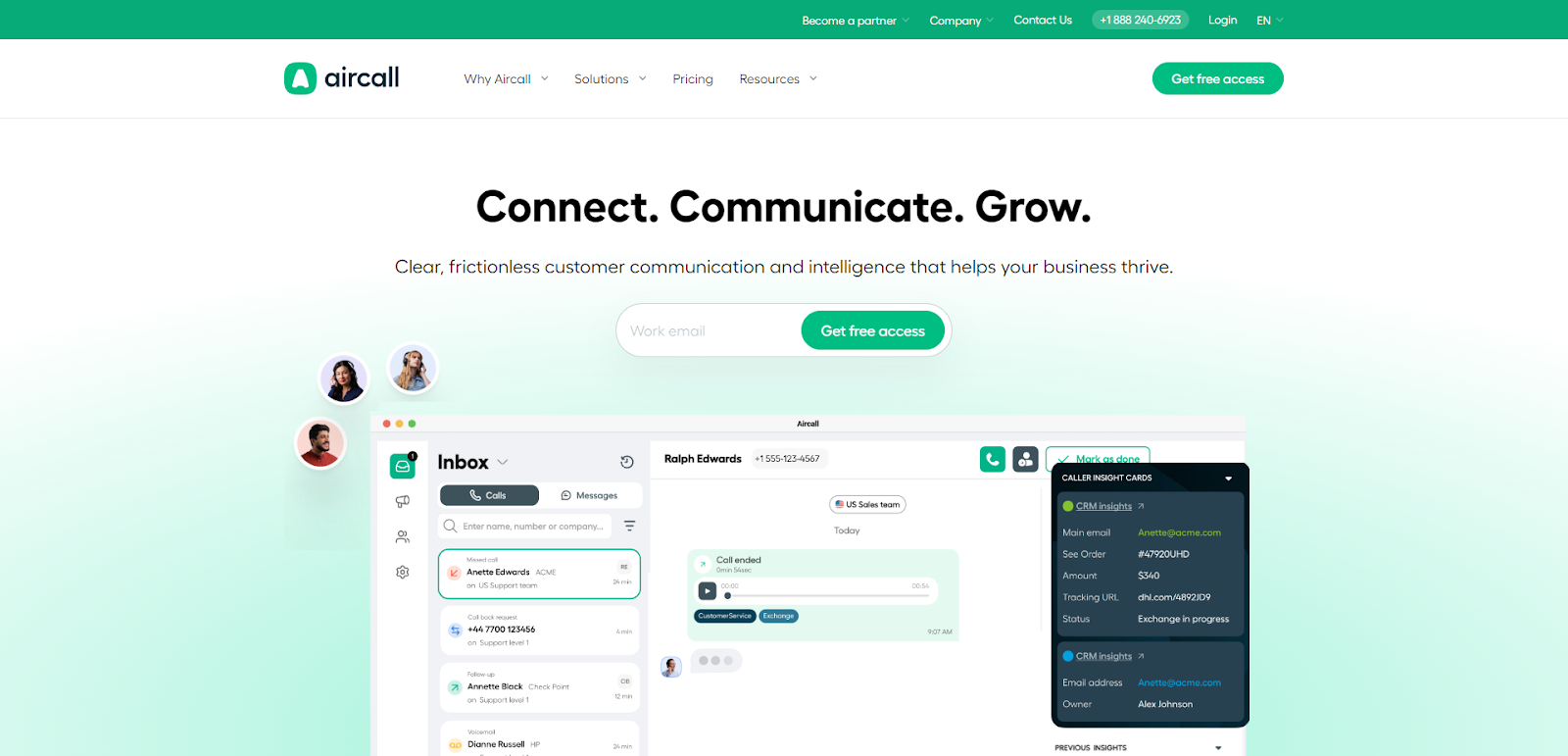
Aircall reimagines business telephony for the smartphone era, offering support teams powerful call management capabilities without traditional hardware constraints.
Best for
- Remote-first teams requiring advanced mobile calling capabilities
Pricing
- Essentials: €30/license
- Professional: €50/license
- Custom: Contact for pricing (25 licenses minimum)
Explore Aircall’s in-depth pricing guide.
Best Features
- Advanced call routing
- Real-time monitoring
- International numbers
Integrations
- Salesforce
- HubSpot
- Pipedrive
- Help desk platforms
Pros & cons
Pros:
- Quick deployment process
- Intuitive mobile interface
- Easy number management
- Flexible call routing
Cons:
- Network dependency
- Premium feature costs
- Limited offline modes
- Basic analytics tools
Considerations:
- Evaluate your internet infrastructure
- Compare costs with expected usage
- Assess offline support requirements
- Define your reporting priorities
Benefits of Customer Service Apps
Embracing mobile customer service solutions transforms how teams deliver support, enabling exceptional customer experiences from anywhere. Here’s what modern customer service apps bring to your operation:
#1 Increased Responsiveness:
Mobile apps empower your team to handle customer inquiries instantly, regardless of location. With real-time notifications and streamlined communication tools, agents can address issues promptly, turning potential frustrations into positive experiences.
#2 Enhanced Efficiency:
Intuitive interfaces and intelligent automation features help agents work smarter, not harder. From easy ticket management to AI-powered suggestions, mobile apps streamline workflows, reducing manual effort and allowing your team to focus on delivering personalized support.
#3 Seamless Collaboration:
Advanced collaboration tools keep your team connected and aligned, even when working remotely. Shared inboxes, real-time chat, and integrated knowledge bases ensure agents can easily access the information and expertise they need to resolve customer issues effectively.
#4 Actionable Insights:
Mobile apps provide real-time analytics and reporting features that turn customer interactions into valuable business intelligence. Monitor key performance metrics, identify trends, and make data-driven decisions to optimize your support strategy and drive continuous improvement.
#5 Flexibility and Scalability:
Cloud-based mobile solutions offer unparalleled flexibility, allowing your team to adapt quickly to changing customer needs and business requirements. As your customer base grows, these apps scale seamlessly, ensuring you can maintain high-quality support without the need for complex infrastructure upgrades.
#6 Competitive Advantage:
In a world where customer experience is a key differentiator, providing exceptional mobile support sets your business apart. By equipping your team with the tools they need to deliver fast, personalized assistance, you’ll foster long-term customer loyalty and gain a powerful competitive edge in your industry.
Discover how CloudTalk’s mobile app can help you unlock these benefits and take your customer service to new heights.
How to Pick the Right Customer Service App
After exploring top solutions and their benefits, choosing the right customer service app comes down to aligning features with your specific support goals. Here’s how to evaluate options strategically:
Understand Your Support DNA
Map your current customer service workflow and identify critical pain points. Whether it’s response times, team collaboration, or scalability challenges, understanding your unique needs helps filter out solutions that don’t align with your core requirements.
Focus on Core Capabilities First
The most powerful app isn’t necessarily the one with the most features. Prioritize solutions that excel at your must-have functionalities – whether that’s seamless ticket management, intelligent routing, or mobile-first design. Additional features should enhance, not complicate, your essential workflows.
Verify Real-World Performance
Look beyond marketing materials and feature lists. Request detailed demos focused on your specific use cases, and ask about performance metrics in similar deployment scenarios. The best solution is one that delivers consistent results in conditions matching your business environment.
Consider Total Implementation Impact
Evaluate the full scope of adopting each solution – from initial setup and team training to ongoing maintenance. A seemingly perfect feature set loses value if implementation disrupts your support operations or requires excessive resources to maintain.
Plan for Tomorrow’s Needs
Your support requirements will evolve. Choose a solution that not only meets today’s needs but offers clear scaling paths. This includes understanding the provider’s development roadmap and ability to adapt as customer service technology advances.
See why CloudTalk consistently ranks as the top choice for growing support teams.
Transform Your Mobile Support Strategy With Cloudtalk
The evolution of customer service goes hand in hand with mobile technology. Changes happen fast, and you need tools that allow you to meet customers’ ever growing expectations.
Choosing the right customer service app isn’t just about features or price points. It’s about finding a solution that enhances your team’s natural workflow while scaling alongside your business growth.
Remember: successful mobile support starts with core functionality and builds toward innovation. CloudTalk embodies this approach, offering essential features like crystal-clear calling and intuitive routing out of the box, while providing a clear path to advanced capabilities as your team grows.
Sources:
FAQs
How does the customer service app work?
A customer service app helps agents manage interactions through in-app support, live chat, or AI-powered tools, enhancing client engagement and experience.
How much does a customer service app cost?
Costs vary, from free customer service apps to premium options offering advanced features like AI customer service and live support tools for small businesses.
What is a good app to keep track of clients?
The best apps for customer service include mobile tools for client tracking, such as customer agent apps or apps for business service optimization.
What is a service mobile application?
A service mobile app provides tools like in-app customer support, chat apps, or AI customer service mobile apps to improve client communication.
What are customer-facing apps?
Customer-facing apps, like live chat apps for small businesses, focus on enhancing customer experience with mobile customer service and support applications.




















